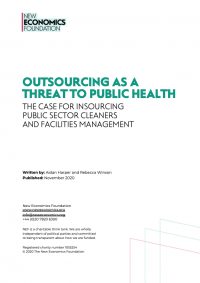Publications Outsourcing as a threat to public health The case for insourcing public sector cleaners and facilities management By Aidan Harper, Rebecca Winson 03 June 2021 Download the report The coronavirus pandemic has forced us to recognise that some of the most essential workers in our society have been undervalued and underfunded for decades. If we are, in Boris Johnson’s words, to “beat coronavirus”, it will be thanks to doctors, nurses and hospital cleaners, all playing vital and
Topics:
Aidan Harper, Rebecca Winson considers the following as important:
This could be interesting, too:
Robert Vienneau writes Austrian Capital Theory And Triple-Switching In The Corn-Tractor Model
Mike Norman writes The Accursed Tariffs — NeilW
Mike Norman writes IRS has agreed to share migrants’ tax information with ICE
Mike Norman writes Trump’s “Liberation Day”: Another PR Gag, or Global Reorientation Turning Point? — Simplicius
Outsourcing as a threat to public health
The case for insourcing public sector cleaners and facilities management
03 June 2021
The coronavirus pandemic has forced us to recognise that some of the most essential workers in our society have been undervalued and underfunded for decades. If we are, in Boris Johnson’s words, to “beat coronavirus”, it will be thanks to doctors, nurses and hospital cleaners, all playing vital and interdependent roles in our healthcare system. But the current model of managing services within much of the public sector makes this impossible.
Cleaners are key workers on the frontline of the fight against Covid-19. The Prime Minister Boris Johnson has said: “They do an extraordinary job and they deserve all the protection and support we can give them at this difficult time”. But the current system of outsourcing neither protects, nor supports cleaners. Outsourced workers are poorly paid, overworked and subject to poor working conditions. This negatively impacts their ability to work effectively, and the quality of the cleaning is severely compromised. This in turn results in an increase of hospital-acquired infections.
In addition, cleaners have contracted Covid-19 at the highest rate of any workers within hospitals – more than doctors and nurses working in acute medicine or intensive care. The inability of cleaners on statutory sick pay to self-isolate without some form of financial penalty, combined with their increased likelihood of catching the virus, means that working conditions associated with outsourcing are likely to have exacerbated the spread of the virus both within and outside of hospitals.
The evidence cited in this report suggests that outsourced health facilities management services pose a threat to public health. This represents a major weakness in the UK’s ability to cope with subsequent waves of Covid-19.
As a matter of public health, this paper recommends that:
- The government should launch an urgent and independent inquiry into the outsourcing of key workers, including cleaners, to assess whether, as the literature suggests, there is a link between outsourcing and higher rates of infection.
- As a pandemic precautionary measure, all local authorities and NHS Trusts should immediately assess their portfolio of healthcare facilities management and sanitation workers, and examine opportunities to bring them in-house.
Photo: iStock
Topics Work & pay Public services Health & social care Ownership




